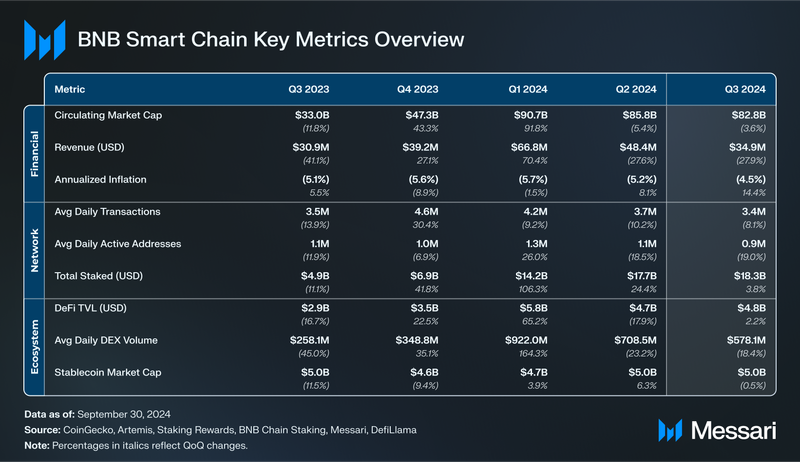Key Insights
- BNB Chain launched several new incentive programs and initiatives, including the Gas-Free Carnival for stablecoin transfers, the Gas Grants Program, and Phase 4 of the TVL Incentive Program.
- DeFi TVL on BNB Smart Chain rose slightly to $4.85 billion, maintaining its rank as the fourth-highest chain by TVL. Venus Finance and Avalon Finance saw the largest gains, with Venus’s TVL up 13% QoQ and Avalon rising over 300% after joining the BNB Incubation Alliance.
- NFT activity saw a resurgence, with average daily trading volume up 283% QoQ to $600,400, though this growth was mainly driven by large individual traders.
- BNB Chain furthered its multichain strategy with the continued rollout of the BNB Chain Bridge, facilitating cross-chain transfers and improving liquidity across the ecosystem.
Primer
BNB Chain (BNB) is an ecosystem of blockchains where each chain serves a particular function. The three core components of BNB Chain are as follows:
- BNB Smart Chain (BSC): Smart contract layer and DeFi hub.
- BNB Beacon Chain: current staking and governance layer (will migrate functionality to BSC and be discontinued to bring heightened efficiency and security to the ecosystem).
- NOTE: BNB Beacon Chain is in the final stage of being sunset as of writing.
- BNB Beacon Chain: current staking and governance layer (will migrate functionality to BSC and be discontinued to bring heightened efficiency and security to the ecosystem).
- BNB Greenfield: Decentralized storage network. As a vital component of the One BNB paradigm, Greenfield focuses on live, valuable data and lets users create their own personal data marketplace.
- opBNB: High-performance optimistic rollup. opBNB is ideal for Dapps that require high transaction frequency, like fully onchain games. It offers the lowest gas fees among L2s, with transactions costing <$0.0001. It delivers very high performance, processing between 5,000 and 10,000 TPS.
The metrics in this report will mostly focus on BNB Smart Chain (BSC). BSC is an EVM-compatible, Layer-1 blockchain secured by a form of Proof-of-Staked-Authority (PoSA) that combines aspects of Proof-of-Authority (PoA) and Delegated Proof-of-Stake (DPoS). In PoSA on BSC, the validator set is of fixed size and is elected by stake weight (staked plus bonded). In addition, validators must continue staking assets to secure the network, and validators chosen to produce blocks are rotated (not based on stake weight). For a full primer on the BNB Chain ecosystem, refer to our Ecosystem report.
Website / X (Twitter) / Telegram
Key Metrics
Financial Overview
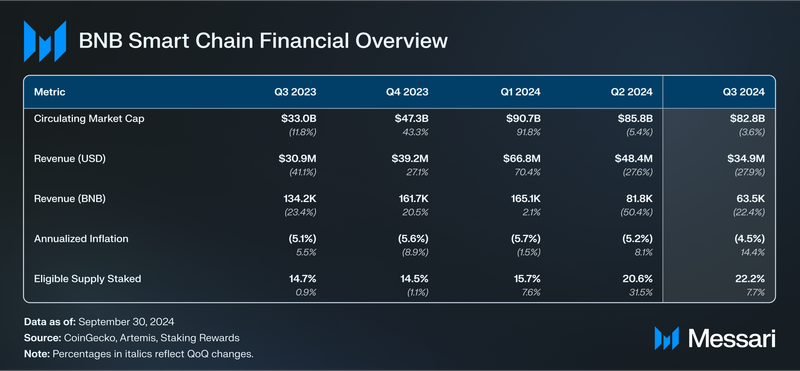
Market Cap and Revenue
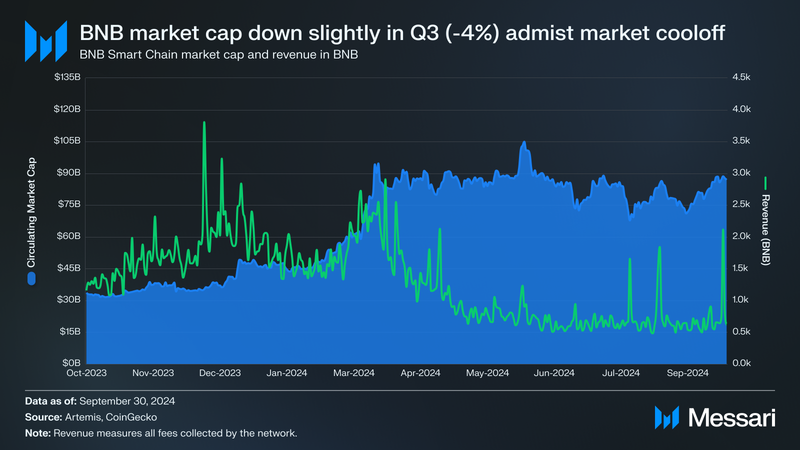
Similarly to the wider crypto market, the price of BNB trended slightly down over Q3’24. At the end of the quarter, BNB’s market cap was $82.79 billion, down 4% QoQ. BNB’s market cap amongst all tokens (excluding stablecoins) remained flat at 3, lagging behind only by ETH and BTC. Additionally, BNB slightly underperformed BTC in Q3, as the circulating market cap of Bitcoin increased by 1% QoQ.
Revenue, which measures all fees collected by the network, experienced a downturn in Q2. In USD terms, revenue in Q3 was $34.9 million, down 28% QoQ from Q2’s revenue of $48.4 million. Revenue in BNB was also down, decreasing 22% QoQ from 81,300 BNB in Q2 to 63,500 BNB in Q3.
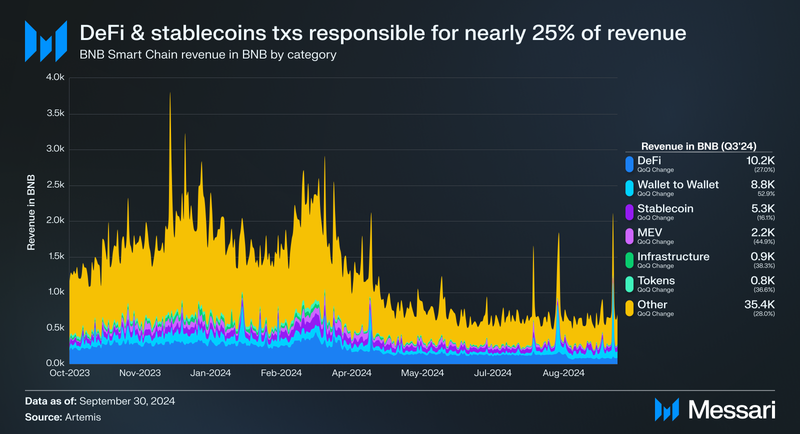
Gas fees paid on DeFi-related transactions have historically been the largest individual contributor to revenue. Q3 continued this trend, as the DeFi category contributed 10,200 BNB in gas fees (down 27% QoQ). Notably, however, DeFi’s share of revenue also decreased 6% QoQ to 16%. Revenue related to wallet to wallet to transactions was up 53% QoQ in Q3 to 8,800 BNB. Additionally, its share of revenue was up 97% QoQ to 14%. Stablecoins also increased its share of revenue, up 8% QoQ to 8%. All other large categories (MEV, Infrastructure, Tokens, and Other) experienced QoQ decreases in both revenue and share of revenue.
Supply Dynamics
The initial total token supply for BNB was 200 million tokens (launched in July 2017). BNB is deflationary through a series of burning mechanisms:
- Auto-Burn: A mechanism that automatically burns varying amounts of BNB every quarter, depending on the token’s price and the number of blocks generated on BNB Chain during said quarter.
- Pioneer Burn: A program that counts all BNB accidentally lost by new or careless BNB Chain users as part of the quarterly burns. The project team reimburses users for accepted cases.
- Gas Fees Burn: In accordance with BEP-95, 10% of all gas fees incurred on BNB Smart Chain are burned automatically. The remaining 90% is rewarded to validators and stakers.
By quarter end, the circulating supply of BNB was 145.9 million, giving BNB an annualized deflation rate of 4.5% (up 14% QoQ). Lastly, the 28th quarterly BNB burn occurred on July 22. 1.6 million BNB was burned, equivalent to $971 million at the time of the burn transaction. All burned BNB came from the Auto-Burn mechanism.
Network Overview
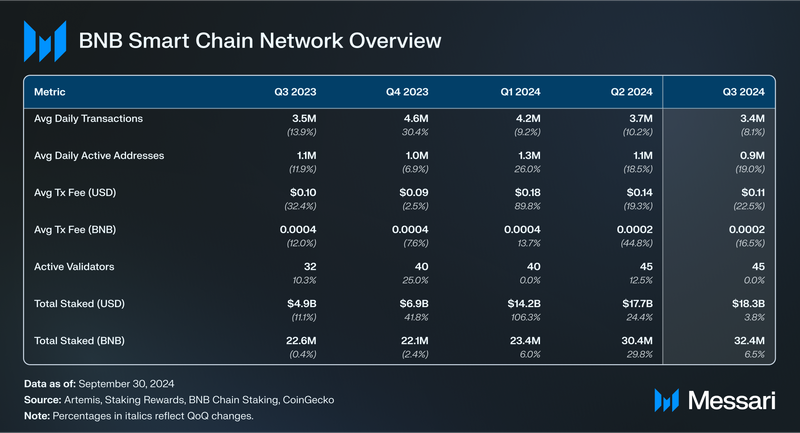
Usage
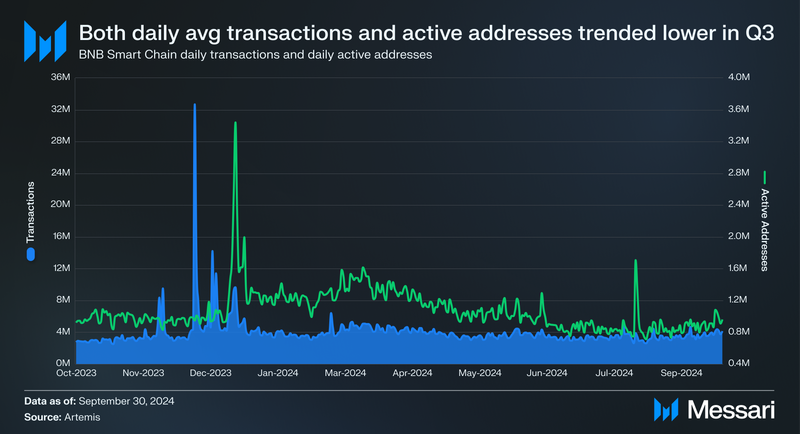
Onchain activity saw a slight dip on BNB Smart Chain in Q3. Average daily transactions trended lower in Q3, down 8% QoQ from 3.7 million to 3.4 million. Average daily active addresses also experienced a downward trend in Q3, decreasing 19% QoQ from 1.1 million to 868,300. Onchain activity decreased across most smart contract platforms in Q3 after an active first half of the year.
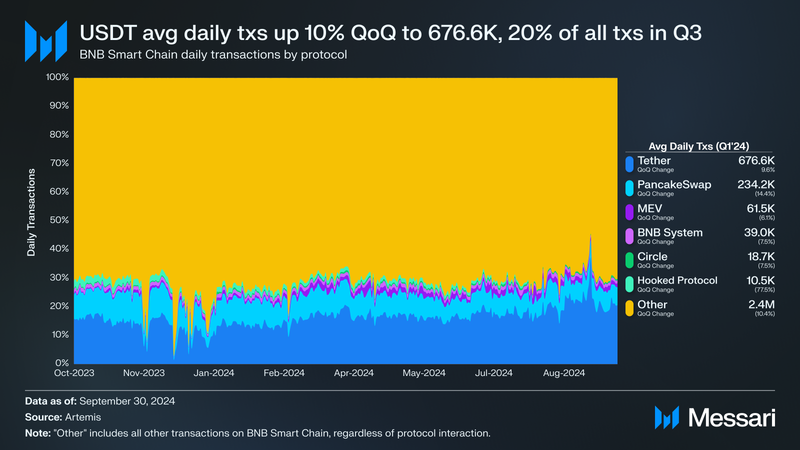
Tether’s USDT accounted for the most transactions related to a singular protocol on BNB Smart Chain in Q3. It averaged 676,600 daily transactions, up 10% QoQ from 617,300. Nearly 20% of all transactions on BNB Smart Chain in Q3 interacted with USDT. USDT more than doubled the second protocol with the most daily transactions, PancakeSwap, which averaged 234,200 daily transactions, down 14% QoQ from 273,600. 7% of all transactions in Q3 interacted with PancakeSwap.
Outside of USDT, no other protocol within the top six experienced QoQ gains in transactions. However, MEV (up 2% QoQ to 2%), BNB System (up 1% QoQ to 1%), and Circle’s USDC (up 1% QoQ to 0.5%) all increased their relative share of transactions QoQ.
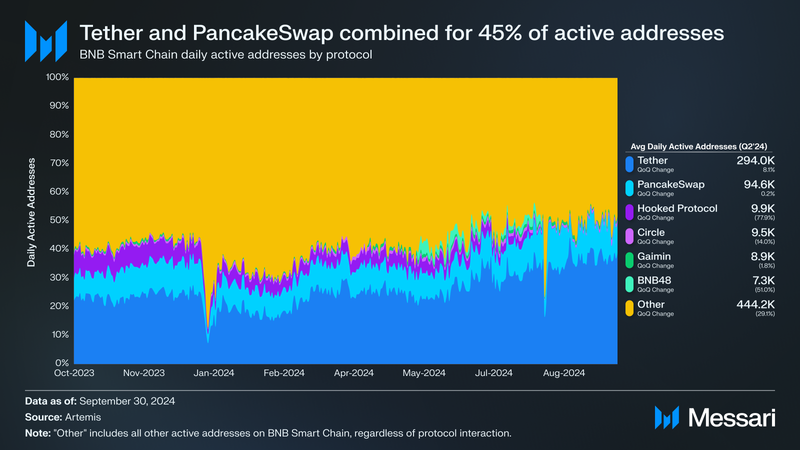
Similarly to transactions, Tether’s USDT accounted for the most active addresses of any singular protocol on BNB Smart Chain in Q3. USDT ended the quarter with an average of 294,000 daily active addresses (up 8% QoQ from 271,800). The second largest protocol by active addresses was PancakeSwap. Average daily active addresses on PancakeSwap were essentially flat QoQ at 94,600. Combined, USDT and Tether represented nearly 45% of all active addresses in Q3. No other individual protocol averaged more than 10,000 daily active addresses.
Security and Decentralization
BNB Smart Chain utilizes a Proof-of-Staked Authority (PoSA) consensus mechanism in which 45 validator nodes are elected every 24 hours to participate in consensus. Their election is based on the total number of BNB tokens staked by/to each node. Of these 45 validators, the top 21 with the highest staked amounts are “Cabinets,” while the remaining 24 are “Candidates.” Then, 18 of the 21 “Cabinets” and 3 of the 18 “Candidates” are randomly selected to produce blocks for the given epoch. Selected validator nodes then take turns producing blocks based on Ethereum’s Clique consensus design.
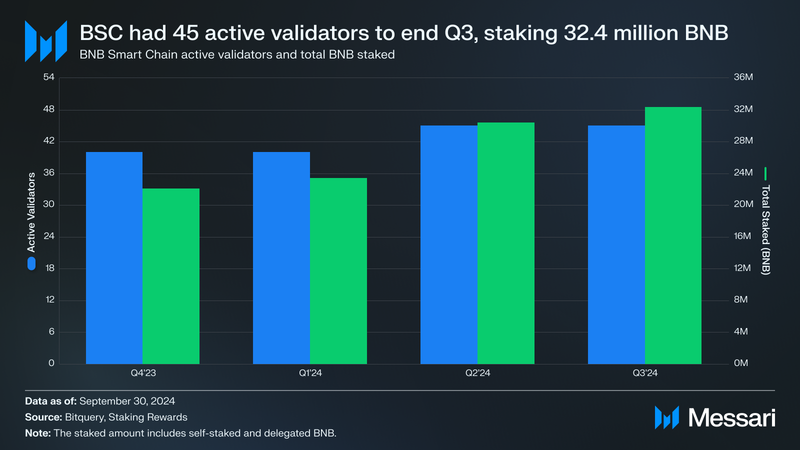
With BNB Chain’s Feynman Upgrade on April 18, the maximum amount of active validators on BNB Smart Chain increased from 40 to 45. Since the upgrade, there have been 45 active validators on BNB Smart Chain, signaling strong network security and a healthy appetite for operating validators on BNB Smart Chain.
Total BNB staked went up for the third straight quarter, in part due to the staking transitioning from BNB Beacon Chain to BNB Smart Chain. Total BNB staked increased by 7% QoQ from 30.4 million to 32.4 million. Since BNB price slightly decreased in Q3, the total dollar amount of BNB staked increased by slightly less (up 4% QoQ from $17.7 billion to $18.3 billion). Compared to other PoS networks, BNB Smart Chain had the third-highest dollar value of funds staked by the end of Q3. However, the gap behind the second-highest (Solana) was $20.7 billion.
MEV
BEP-322, a proposal for Proposer-Builder Separation (PBS) on BNB Smart Chain validators, went live last quarter in Q2. BEP-322 was implemented as a builder API specification to address the fragmentation of MEV (maximal extractable value) solutions on BSC. This specification creates a unified MEV market where block proposers (i.e., validators) do not play a role in selecting which transactions are included in the proposed block. Instead, block builders create possible blocks and submit them to the validator proposing a block. The validator then selects the proposed blocks that net them the most fees. This new mechanism brings stability and transparency to BNB Chain’s MEV market while also promoting healthy market competition for block builders.
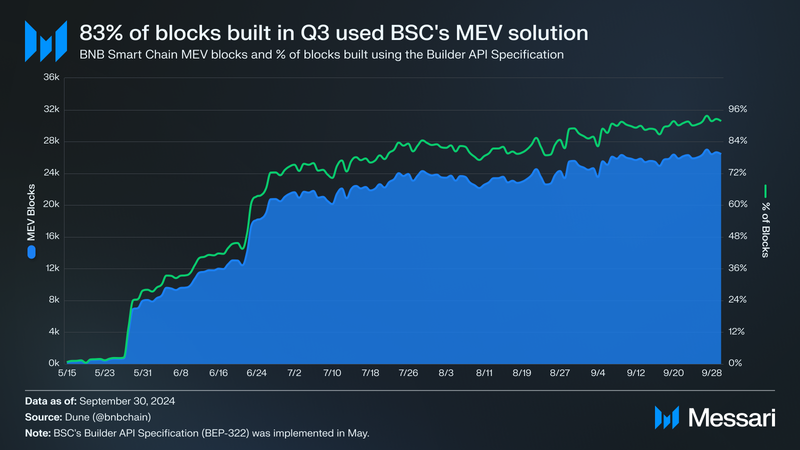
BNB Smart Chain’s Builder API Specification went live in May. Throughout the quarter, 83% of all blocks were built using the Builder API Specification. On the final day of Q3, 92% of all blocks created that day were built using the Builder API Specification. Furthermore, as of writing, there are 35 different block builders on BNB Smart Chain.
Technical Developments
Last quarter, BNB Beacon Chain began the process of being sunset. While BNB Beacon Chain was used as BNB Chain’s staking and governance layer, it introduced complexity and some security vulnerabilities due to the bridging between BSC and BNB Beacon Chain. For this reason, BNB Chain began migrating BNB Beacon Chain functionality to BNB Smart Chain. BEP-333: Chain Fusion will be implemented across four different upgrades.
- BNB Beacon Chain First Sunset Fork (Implemented on April 15) – Disabled cryptocurrency issuance and minting features on BNB Beacon Chain.
- BNB Smart Chain Feynman Hard Fork (Implemented on April 18) – Enabled validator creation and governance functionality on BNB Smart Chain.
- BNB Beacon Chain Second Sunset Fork (Implemented on July 14) – Disabled governance and delegation capabilities on BNB Beacon Chain.
- BNB Beacon Chain Final Sunset Fork (Scheduled for November 19) – Halts BNB Beacon Chain and disables cross-chain communication to BNB Smart Chain.
BNB Chain also underwent a series of hard forks and technical upgrades unrelated to BNB Chain Fusion in Q3:
- BNB Greenfield Veld Hardfork (July 8) – Key features include adding bucket status to bucket migration related events, fixes discontinued buckets that cannot be migrated, fixes principal value that supports group name, and ignores a register channel error.
- BNB Greenfield Mongolian Hardfork (Aug 8) – Key features include supporting msg to create policy by a cross-chain, fixing initial val for minimum value comparisons that should be large enough, and fixing broken links rerouted from the local repo to bnbchain docs.
- opBNB Wright Hardfork (Aug 27) – This upgrade introduces several changes, such as setting the base fee to zero, supporting the bundle features, and handling persistent ID when using nodebufferlist. Mainnet Op-Geth nodes must upgrade to Op-Geth v0.4.5 before the hard fork.
- BNB Greenfield Altai Hardfork (Sep 23) – The Altai hard fork addresses the compatibility issues between Greenfield and the Metamask extension.
- BNB Smart Chain Bohr Hardfork (Sep 25) – The upgrade will introduce the following four BEPs:
Development Roadmap
On January 31, BNB Chain released its roadmap for 2024. The roadmap is multifaceted, featuring robust plans for BNB Smart Chain, BNB Greenfield, opBNB, and more. The goal of future development efforts is to unify the current ecosystems and chains with the multichain paradigm, One BNB within BNB Chain for a unified, seamless experience. Some key highlights include:
- BNB Smart Chain – Complete the BNB Chain Fusion, expand the validator set to 100, introduce delegate voting, MEV proposer-builder separation, and a new parallelized EVM.
- opBNB – Increase the gas limit to 200 million and achieve 10,000 TPS (occurred this quarter), implement BEP-336 (occurred last quarter), and introduce ZK fault proofs and a shared sequencer set.
- BNB Greenfield – Add permanent storage and make it a data availability layer.
Ecosystem Overview
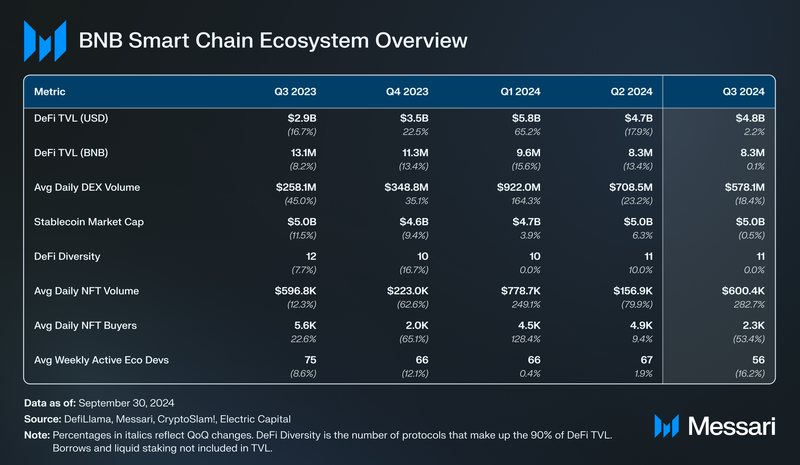
DeFi
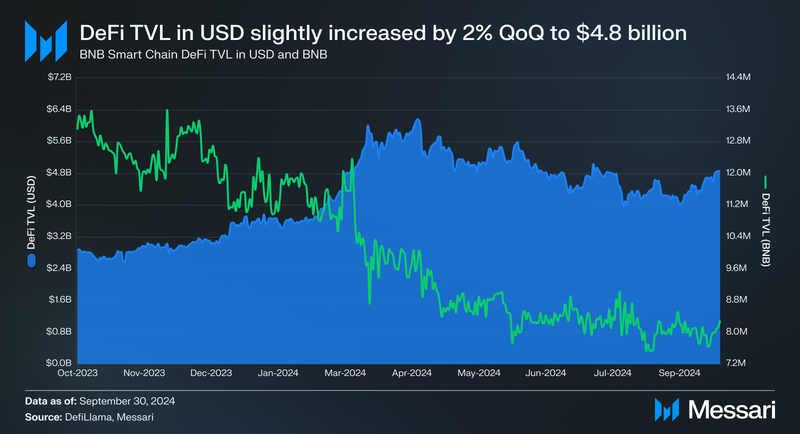
BNB Smart Chain DeFi TVL denominated in USD, slightly increased from $4.74 billion in Q2 to $4.85 billion, a 2% QoQ increase. This ranked BNB Smart Chain as the fourth-highest chain by TVL denominated in USD by the end of the quarter, falling 1 spot after being surpassed by Solana in July. TVL denominated in BNB was essentially flat QoQ at 8.3 million BNB (+10,700 BNB QoQ). This dynamic indicates that part of the TVL decrease in USD was driven by capital inflows.
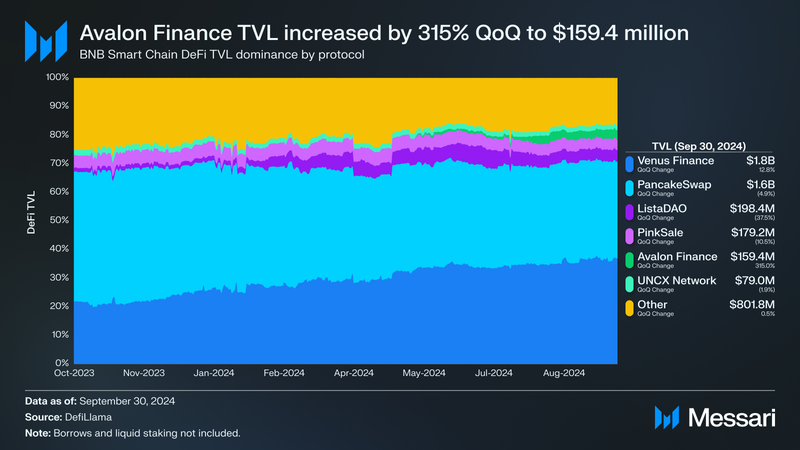
The top two protocols by TVL on BNB Smart Chain are Venus Finance and PancakeSwap. Venus Finance, the largest protocol by TVL, increased 13% QoQ from $1.59 billion to $1.79 billion. Notably, despite the increase in TVL, borrows decreased from $707 million in Q2 to $454 million in Q3, a 36% QoQ decrease. By the end of Q3, Venus Finance’s TVL dominance was 37% (up 10% QoQ from 34%).
PancakeSwap saw a slight decline in TVL in Q3, falling from $1.72 billion to $1.64 billion, a 5% QoQ decrease. PancakeSwap consists of three different AMMs (PancakeSwap AMM, StableSwap, and AMM V3). By the end of Q3, AMM TVL was $1.19 billion (73% of TVL), StableSwap TVL was $14.7 million (less than 1% of TVL), and AMM V3 TVL was $379.1 million (23% of TVL). However, PancakeSwap’s TVL dominance decreased to 34% (down 7% QoQ from 36%). In sum, Venus Finance and PancakeSwap represented 71% of TVL on BNB Smart Chain.
The only protocol within the top six outside of Venus Finance with a TVL gain was Avalon Finance, a lending protocol for BTC-based assets on multiple networks. Avalon Finance launched lending markets on BNB Smart Chain in May and quickly garnered 8 figures in TVL. On July 31, Avalon Finance was announced as one of the winners of BNB Incubation Alliance Round 2, which fast-tracked them into BNB Chain’s Most Valuable Builder (MVB) program. After this announcement, TVL on Avalon Finance quickly eclipsed $100 million and ended the quarter at $159.4 million (up 315% QoQ from $38.4 million).
The remaining protocols in the top six are ListaDAO, PinkSale, and UNCX Network. ListaDAO, a CDP stablecoin lending and liquid staking protocol, saw its TVL decline in Q3 by 38% QoQ from $317.6 million to $198.4 million (ListaDAO’s liquid staking TVL is not included in this figure). ListaDAO has been running a rewards program since Q1. Part of its TVL decline in Q3 can be attributed to fleeting mercenary capital in search of better yield opportunities. PinkSale, a token launchpad protocol, had a 11% QoQ decrease from $200.2 million to $179.2 million. Rounding out the top six was UNCX Network, a DeFi infrastructure protocol that provides various token services. Its TVL decreased 2% QoQ from $80.5 million to $79.0 million.
In Q4, BNB Smart Chain introduced the TVL Incentive Program. The program aims to reward projects deployed within the ecosystem that attract significant amounts of TVL. In Q3, Phase 2 ended, running from June 27 to July 27. Phase 3 was a two-part program featuring prize pools for two categories: Liquid Staking and DeFi. In total, $300,000 was rewarded to the eight projects:
- Liquid Staking – Venus Finance, PancakeSwap, and Kinza Finance.
- DeFi – Solv, BitU, Avalon Finance, KiloEx, and Harbor Market.
On September 4, Phase 4 of the TVL Incentive Program was announced. Phase 4 is a two-part program featuring prize pools for two categories: Liquid Staking and DeFi. The liquid staking prize pool is $100,000 and will be split amongst three winners, while the DeFi prize pool is up to $200,000 and will be split amongst five winners. Phase 4 runs from September 12 to October 11.
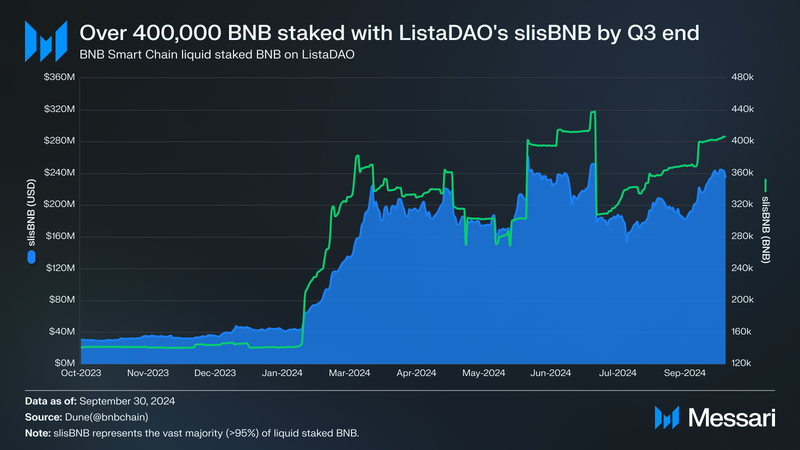
With the migration of validation and staking services to BNB Smart Chain this past year, liquid staking has become a top priority for the BNB Chain ecosystem. Concurrently, ListaDAO’s liquid staking solution, slisBNB, has emerged as the dominant liquid staking solution on BNB Smart Chain. By the end of Q3, there was 406,200 BNB ($234.4 million) staked on ListaDAO, down 2% QoQ from 412,700 slisBNB ($237.3 million) in Q2.
On September 15, BNB Smart Chain’s first restaking token protocol, YieldNest, launched. YieldNest allows for slisBNB to be restaked as ynBNB, where it is then deposited into restaking protocols such as Karak. Retaking, alongside liquid staking, aims to be an area of growth for BNB Smart Chain in the coming quarters.
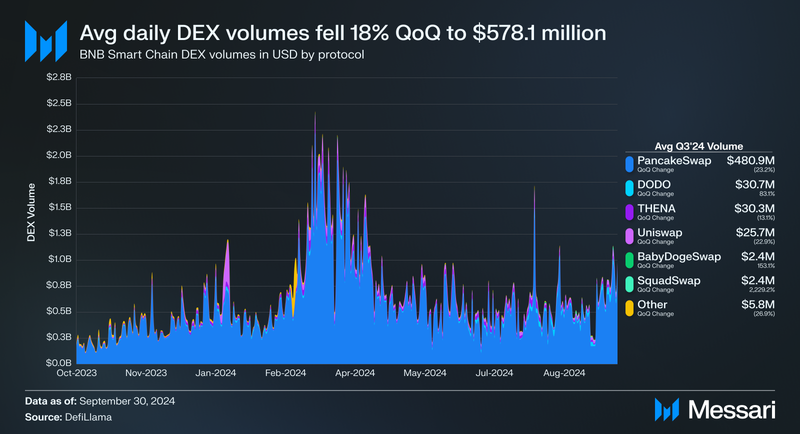
DEX volumes have been trending downwards across most smart contract platforms after peaking in March. This trend continued in Q3 for BNB Smart Chain as the average daily DEX volume decreased by 18% QoQ from $708.5 million to $578.1 million. BNB Smart Chain had the fourth most DEX volumes of any chain in Q3 ($53.73 billion). Only Ethereum ($138.15 billion), Solana ($121.47 billion), and Arbitrum ($58.53 billion) had more DEX volume.
By the end of Q3, there were 69 different DEXs (up 3 QoQ) on BNB Smart Chain. Despite the high level of competition, PancakeSwap has historically been the most dominant DEX on BNB Smart Chain. In Q3, PancakeSwap’s average daily DEX volume was $480.9 million, down 23% % QoQ from $625.8 million. PancakeSwap’s dominance fell 4% QoQ from 87% to 83%. The biggest gainer in average daily volume for Q3 was DODO. Its average daily volume increased 83% QoQ to $30.7 million, making it the second largest DEX on BNB Smart Chain by volume. For Q3, the top five DEXs by average daily trading volume were:
1. PancakeSwap ($480.9 million – 83% of BNB Smart Chain DEX volume)
2. DODO ($30.7 million – 5% of BNB Smart Chain DEX volume)
3. THENA ($30.3 million – 5% of BNB Smart Chain DEX volume)
4. Uniswap ($25.7 million – 4% of BNB Smart Chain DEX volume)
5. BabyDogeSwap ($2.4 million – less than 1% of BNB Smart Chain DEX volume)
On May 21, BNB Chain announced the Trading Volume Incentive Program. The program aims to increase trading volumes on protocols through prize-based rewards. The total prize pool consists of $200,000, and the top ten protocols will split the prize pools. Winners are determined both by total trading volume and incremental trading volume over the period. The program lasted until July 9. Rewards were sent out to the 10 projects with the most incremental volume gains: PancakeSwap, THENA, APX Finance, uDEX, KiloEx, WOOFI, Sigma, Velvet Capital, KTX, and Level Finance.
Stablecoins and BTC
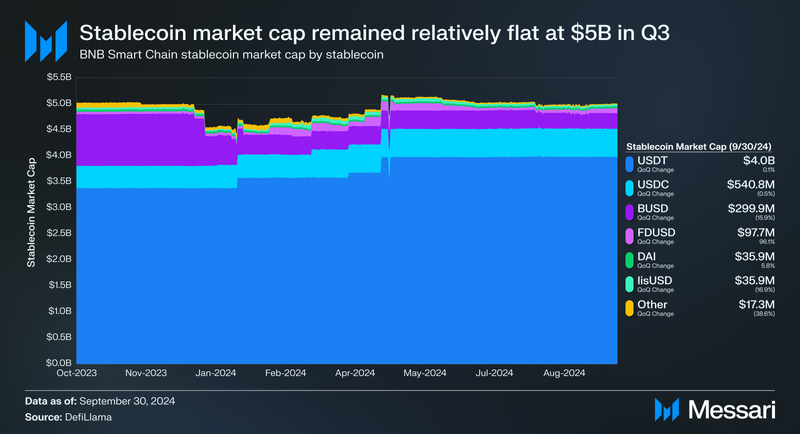
The stablecoin market cap on BNB Smart Chain was on a downtrend in 2023, primarily due to the decrease BUSD’s supply. In Q1’23, NYDFS ordered Paxos (the BUSD issuer) to cease issuance, and various centralized exchanges, such as Coinbase, suspended BUSD trading. As such, the stablecoin market cap on BNB Smart Chain decreased every quarter in 2023.
However, this trend largely reversed in the first half of 2024 due to the growth of other stablecoins on BNB Smart Chain. For Q3, the stablecoin market cap remained relatively flat, decreasing from $5.03 billion to $5.00 billion (a $24.9 million decrease). USDT, the largest stablecoin on BNB Smart Chain, saw its market cap increase slightly from $3.97 billion to $3.98 billion. By the end of Q3, USDT represented 79% of the stablecoin market on BNB Smart Chain (flat QoQ). As for the second largest stablecoin, USDC saw marginal losses in Q3, falling from $543.4 million to $540.8 million.
At the end of Q3, BNB Smart Chain launched the “Gas-Free Carnival,” an initiative to increase stablecoin adoption on the platform. The Gas-Free Carnival allows users to transfer stablecoins with no gas fees, offering several options for seamless transactions:
- Gas-Free Stablecoin Transfers: Users can send USDT, USDC, and FDUSD across BNB Smart Chain and opBNB with no gas fees, supported by Bitget Wallet and SafePal.
- 0-Fee Withdrawals: Participating exchanges like Binance, Bitget, Gate.io, and SafePal offer fee-free withdrawals of these stablecoins to BNB Smart Chain.
- Free Bridging via Celer cBridge: Celer cBridge allows users to bridge supported stablecoins to BNB Smart Chain or opBNB networks without cost.
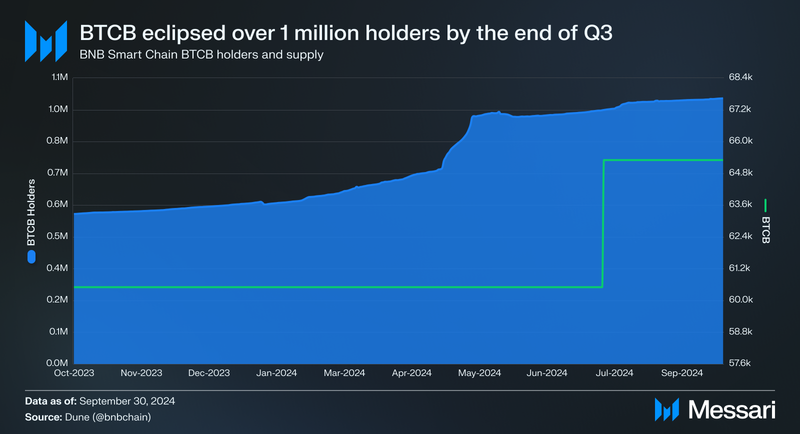
BTCB is one of the largest assets by market cap on the BNB Smart Chain, outside of BNB and stablecoins. It is a tokenized version of Bitcoin on the BNB Smart Chain. The supply of BTCB in Q3 was up 8% QoQ to 65,300, equivalent to $4.13 billion. As for BTCB holders, they increased 7% QoQ to just slightly over 1 million. BNB Smart Chain has been bolstered by its emergent BTCFi ecosystem. Projects like Solv Finance, Lorenzo, Lombard Finance, and more offer BTCB holders on BNB Smart Chain to participate in various DeFi opportunities.
opBNB
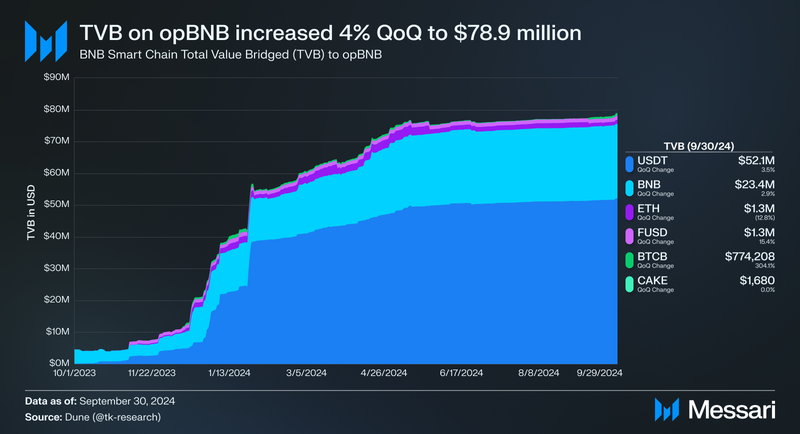
opBNB is an EVM-compatible optimistic rollup that helps scale execution throughput for BNB Smart Chain. Since launching in the middle of Q3, total value bridged (TVB) has been in a consistent uptrend. In Q3, $3 million was bridged to opBNB, bringing TVB to $78.9 million (up 4% QoQ from $75.9 million). USDT (up 4% QoQ to $52.1 million) remains the most popular bridged token on opBNB, representing 66% of all TVB. In percentage terms, BTCB was the biggest gainer in Q3, increasing 304% QoQ to $774,200.
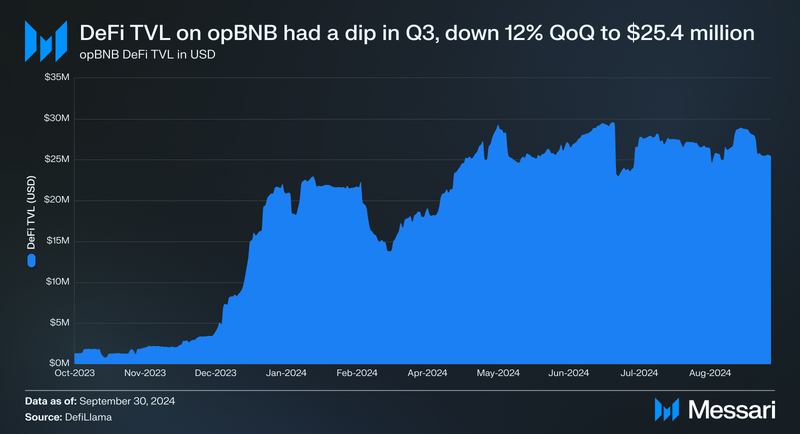
DeFi TVL on opBNB has been consistently trending higher in 2024, in part due to various TVL incentive programs throughout 2024. DeFi TVL on opBNB slightly pulled back in Q3, decreasing 12% QoQ from $28.9 million to $25.4 million. DeFi TVL on opBNB has been primarily bolstered by two projects: KiloEx ($17.4 million in TVL) and PancakeSwap ($6.5 million). Collectively, the two projects accounted for 94% of the TVL on opBNB in Q3.
NFTs
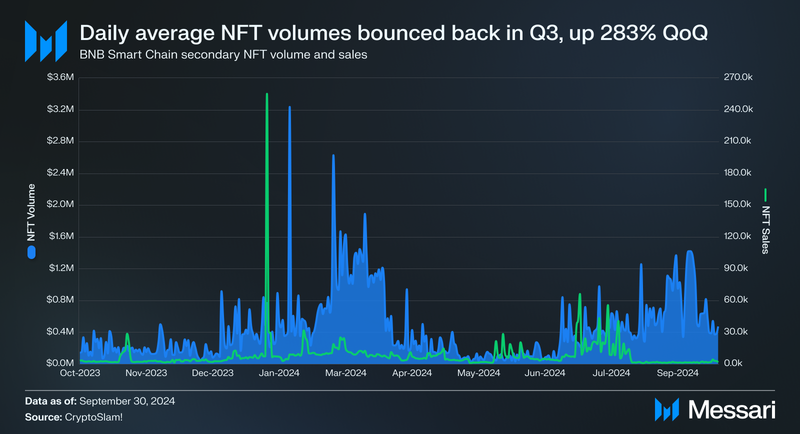
After slumping in Q2, NFT activity bounced back in Q3. The average daily NFT trading volume increased by 283% QoQ from $156,900 to $600,400. Average daily sales also saw an increase, up 47% QoQ to 8,900. However, average daily buyers were down 53% QoQ to 2,300, signaling that NFT activity in Q3 was driven by “whales” rather than small users.
Ecosystem Growth
BNB Chain continues to support new projects within its ecosystem through its Most Valuable Builder (MVB) Accelerator Program. In August, BNB announced the results of the seventh season of MVB. There were over 700 applications and five different projects received investment from Binance Labs:
- Aggregata – Platform for AI data and models
- Blum – Telegram-based application for crypto trading
- O.LAB – Dynamic prediction market
- SideKick – Social hub for gaming and more
- Vooi – Cross-chain aggregator for perpetual DEXs
Season 8 of MVB was also announced at the end of August. Season 8 of the BNB Chain MVB program offers a focused four-week acceleration for early-stage Web3 projects, with continued collaboration between Binance Labs, CMC Labs, and BNB Chain.
Outside of the MVB Accelerator Program, BNB Smart Chain hosted a hackathon in Q3. Application submissions were open from July 31 to August 28, and just under 200 different applications were submitted. The total prize pool consisted of $500,000, and there were three different tracks: Gaming, Social, and Payments. The winners of the hackathon were announced on October 2:
- First place ($15,000) – zkGraph
- Second Place ($10,000 each) – Siren and CryptoBed
- Third Place ($5,000 each) – The Witch Credit Card, GreenPress, and Bakeland
A list of all other projects that qualified for prize money can be found here.
BNB Chain also launched a series of community and ecosystem initiatives in Q3:
- BNB Chain Telegram Mini Games Report (Aug 2) – BNB Chain highlighted the rise of Telegram mini-games within its ecosystem, noting their growing popularity as gateways to Web3. These mini-apps integrate seamlessly into Telegram, allowing users to access Web3 services, including decentralized exchanges and NFT marketplaces, without leaving the app. Notable projects include Eggdrop by GombleGames, which features token-based gameplay, and Let’s Throw Slime by SkyArk Chronicles, an interactive NFT-based game.
- BNB Incubation Alliance (BIA) Winners (August 6) – Last quarter, BNB Chain announced its BNB Incubation Alliance, an incubator program for early-stage ecosystem projects seeking BNB grants and investments from Binance Labs. At the BNB Incubation Alliance during Bitcoin 2024 in Nashville, the winners were Avalon Finance and Bedrock. At EthCC in Brussels, the winners included Balloon Dogs, Blackwing, and Payman.
- Meme Coin Innovation Battle Round #3 (Aug 13) – This program offers up to $150,000 in prizes to boost BNB Smart Chain’s memecoin ecosystem. It focuses on launching new meme coins and enhancing liquidity for existing ones, with tailored marketing and access to a $900,000 liquidity pool to support growth. Memecoin launchpads four.meme, MyShell, Flap, and Burve also offered additional incentives.
- Gas Grants Program (Aug 19) – This program offers over $1 million in rewards over a three-month period to incentivize projects on either BNB Smart Chain or opBNB that meet specific criteria, such as daily active users requirements and passing a security audit. Each month, up to $440,000 will be distributed based on participants’ gas fee generation and user engagement, with top projects eligible for gas fee refunds up to 80%, capped at $50,000 per project.
- BNB Chain Bridge (Aug 28) – Developed in collaboration with Celer, deBridge, and Stargate, the BNB Chain Bridge enhances liquidity, connectivity, and user experience on BNB Smart Chain. It streamlines cross-chain transfers, allowing users to easily navigate between popular tokens and bridges. Additionally, liquidity pools support faster and more competitive asset transfers.
Closing Summary
In Q3, BNB Smart Chain showed steady progress, with key developments across DeFi, staking, and cross-chain initiatives. Despite a minor decline in BNB’s market cap (down 4% QoQ), network activity stayed strong with daily transactions reaching 3.4 million, though slightly down from Q2. BNB Chain’s DeFi TVL grew by 2% QoQ to $4.85 billion, solidifying its position as the fourth largest by TVL. Venus Finance led with a 13% TVL increase, while new entrants like Avalon Finance saw impressive gains after joining the BNB Incubation Alliance. The launch of liquid staking solutions and the opBNB rollup helped drive engagement and bridge TVB, enhancing liquidity and user experience on BNB Chain.
The ecosystem’s growth is also marked by extensive development programs, including the ongoing Most Valuable Builder (MVB) Accelerator and hackathons. A series of community initiatives further bolstered user engagement, including the Gas-Free Carnival, Telegram mini-games, and cross-chain BNB Chain Bridge.

